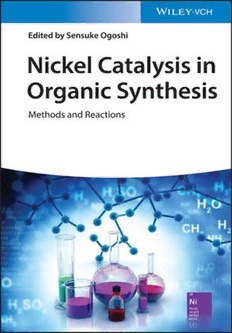
Nickel catalysis in organic synthesis: methods and reactions PDF
Preview Nickel catalysis in organic synthesis: methods and reactions
NickelCatalysisinOrganicSynthesis Nickel Catalysis in Organic Synthesis MethodsandReactions Editedby SensukeOgoshi Editor AllbookspublishedbyWiley-VCH arecarefullyproduced.Nevertheless, Prof.SensukeOgoshi authors,editors,andpublisherdonot OsakaUniversity warranttheinformationcontainedin DepartmentofAppliedChemistry thesebooks,includingthisbook,to 1-1Yamadaoka,Suita befreeoferrors.Readersareadvised 565-0871Osaka tokeepinmindthatstatements,data, Japan illustrations,proceduraldetailsorother itemsmayinadvertentlybeinaccurate. CoverImages:©bluebay/Shutterstock; ©JohnWiley&Sons,Inc. LibraryofCongressCardNo.: appliedfor BritishLibraryCataloguing-in-Publication Data Acataloguerecordforthisbookis availablefromtheBritishLibrary. Bibliographicinformationpublishedby theDeutscheNationalbibliothek TheDeutscheNationalbibliotheklists thispublicationintheDeutsche Nationalbibliografie;detailed bibliographicdataareavailableonthe Internetat<http://dnb.d-nb.de>. ©2020Wiley-VCHVerlagGmbH& Co.KGaA,Boschstr.12,69469 Weinheim,Germany Allrightsreserved(includingthoseof translationintootherlanguages).No partofthisbookmaybereproducedin anyform–byphotoprinting, microfilm,oranyothermeans–nor transmittedortranslatedintoa machinelanguagewithoutwritten permissionfromthepublishers. Registerednames,trademarks,etc.used inthisbook,evenwhennotspecifically markedassuch,arenottobe consideredunprotectedbylaw. PrintISBN:978-3-527-34407-9 ePDFISBN:978-3-527-81379-7 ePubISBN:978-3-527-81381-0 oBookISBN:978-3-527-81382-7 Typesetting SPiGlobal,Chennai,India PrintingandBinding Printedonacid-freepaper 10 9 8 7 6 5 4 3 2 1 v Contents Preface xi PartI ReactionsviaNickelacycles 1 1 FormationofNickelacyclesandReactionwithCarbon Monoxide 3 SensukeOgoshi 1.1 Introduction 3 1.2 FormationofHetero-nickelacyclesfromNickel(0) 3 1.3 StoichiometricReactionofHetero-nickelacycleswithCarbon Monoxide 4 References 9 2 TransformationofAldehydesviaNickelacycles 13 YoichiHoshimoto 2.1 IntroductionandScopeofThisChapter 13 2.2 CatalyticTransformationofAldehydesThroughThree-Membered OxanickelacycleComplexes 14 2.3 CatalyticTransformationofAldehydesThroughFive-Membered OxanickelacycleComplexes 18 2.4 CatalyticTransformationofAldehydesThroughSeven-Membered OxanickelacycleComplexes 22 2.5 ConclusionandOutlook 23 References 25 3 TransformationofIminesviaNickelacycles 29 MasatoOhashi 3.1 Introduction 29 3.2 [2+2+1]CarbonylativeCycloadditionofanImineandEitheran AlkyneoranAlkeneLeadingtoγ-Lactams 29 3.3 [2+2+2]CycloadditionReactionofanIminewithTwoAlkynes: Formationof1,2-DihydropyridineDerivatives 31 vi Contents 3.4 Three-ComponentCouplingandCyclocondensationReactionsofan Imine,anAlkyne,andAlkylmetalReagents 34 References 37 4 AsymmetricC—CBondFormationReactionsvia Nickelacycles 39 RavindraKumarandSensukeOgoshi 4.1 Introduction 39 4.2 EnantioselectiveReactionsInvolvingNickelacycles 39 4.2.1 Nickel-CatalyzedAsymmetricCouplingofAlkynesand Aldehydes 39 4.2.1.1 Nickel-CatalyzedAsymmetricReductiveCouplingofAlkynesand Aldehydes 40 4.2.1.2 Nickel-CatalyzedAsymmetricAlkylativeCouplingofAlkynesand Aldehydes 43 4.2.2 Nickel-CatalyzedAsymmetricCouplingofAlkynesandImines 44 4.2.3 Nickel-CatalyzedAsymmetricCouplingof1,3-Enynesand Aldehydes 45 4.2.4 Nickel-CatalyzedAsymmetricCouplingof1,3-Enynesand Ketones 46 4.2.5 Nickel-CatalyzedAsymmetricCouplingof1,3-Dienesand Aldehydes 47 4.2.6 Nickel-CatalyzedAsymmetricCouplingofEnonesandAlkynes 50 4.2.6.1 Nickel-CatalyzedAsymmetricAlkylativeCouplingofEnonesand Alkynes 50 4.2.6.2 Nickel-CatalyzedAsymmetricCouplingofEnonesandAlkynes 51 4.2.7 Nickel-CatalyzedAsymmetricCouplingofArylenoatesand Alkynes 55 4.2.8 Nickel-CatalyzedAsymmetricCouplingofDiyneswithKetenes 56 4.2.9 Nickel-CatalyzedAsymmetricCouplingofAllenes,Aldehydes,and Silanes 57 4.2.10 Nickel-CatalyzedAsymmetricCouplingofAllenesand Isocyanates 58 4.2.11 Nickel-CatalyzedAsymmetricCouplingofAlkenes,Aldehydes,and Silanes 59 4.2.12 Nickel-CatalyzedAsymmetricCouplingofFormamideand Alkene 61 4.2.13 Nickel-CatalyzedAsymmetricCouplingofAlkynesandCyclopropyl Carboxamide 63 4.3 Miscellaneous 64 4.3.1 Nickel-CatalyzedAsymmetricAnnulationofPyridonesvia HydroarylationtoAlkenes 64 4.3.2 Nickel-CatalyzedAsymmetricSynthesisofBenzoxasilole 65 4.4 OverviewandFuturePerspective 66 References 67 Contents vii PartII FunctionalizationofUnreactiveBonds 69 5 RecentAdvancesinNi-CatalyzedChelation-AssistedDirect FunctionalizationofInertC—HBonds 71 Yan-HuaLiu,FangHu,andBing-FengShi 5.1 Introduction 71 5.2 Ni-CatalyzedFunctionalizationofInertC—HBondsAssistedby BidentateDirectingGroups 71 5.2.1 Arylation 72 5.2.2 Alkylation 76 5.2.3 Alkenylation 83 5.2.4 Alkynylation 85 5.2.5 OtherC—CBondFormationReactionsDirectedbyBidentate DirectingGroup 88 5.2.6 C—NBondFormation 89 5.2.7 C–Chalcogen(Chalcogen=O,S,Se)BondFormation 89 5.2.8 C–HalogenBondFormation 92 5.3 Ni-CatalyzedFunctionalizationofInertC—HBondsAssistedby MonodentateDirectingGroups 94 5.3.1 Alkylation 94 5.3.2 Alkenylation 95 5.3.3 Alkynylation 96 5.3.4 C–CalcogenBondFormation 97 5.4 Summary 98 References 98 6 C—CBondFunctionalization 103 YoshiakiNakao 6.1 Introduction 103 6.2 C—CBondFunctionalizationofThree-MemberedRings 103 6.3 C—CBondFunctionalizationofFour-andFive-Membered Rings 110 6.4 C—CBondFunctionalizationofLessStrainedMolecules 113 6.5 C—CNBondFunctionalization 115 6.6 SummaryandOutlook 116 References 117 7 C—OBondTransformations 123 MamoruTobisu 7.1 Introduction 123 7.2 C(aryl)—OBondCleavage 124 7.2.1 ArylEsters,Carbamates,andCarbonates 124 7.2.2 ArylEthers 132 7.2.3 Arenols 136 7.3 C(benzyl)—OBondCleavage 138 viii Contents 7.3.1 BenzylEstersandCarbamates 138 7.3.2 BenzylEthers 140 7.4 C(acyl)—OBondCleavage 141 7.5 SummaryandOutlook 144 References 145 PartIII CouplingReactionsviaNi(I)and/orNi(III) 151 8 Photo-AssistedNickel-CatalyzedCross-Coupling Processes 153 ChristopheLévêque,CyrilOllivier,andLouisFensterbank 8.1 Introduction 153 8.2 DevelopmentofVisible-LightPhotoredox/NickelDualCatalysis 154 8.2.1 FortheFormationofCarbon–CarbonBonds 154 8.2.1.1 StartingfromOrganotrifluoroborates 154 8.2.1.2 StartingfromCarboxylatesorKetoAcidsorfromMethylanilines 157 8.2.1.3 StartingfromAlkylsilicates 160 8.2.1.4 Startingfrom1,4-Dihydropyridines 166 8.2.1.5 StartingfromAlkylsulfinates 168 8.2.1.6 StartingfromAlkylBromides 168 8.2.1.7 StartingfromXanthates 169 8.2.1.8 StartingfromSp3CHBonds 169 8.2.2 FortheFormationofCarbon–HeteroatomBonds 170 8.2.2.1 FormationofC—OBond 170 8.2.2.2 FormationofC—PBond 171 8.2.2.3 FormationofC—SBond 171 8.3 Energy-Transfer-MediatedNickelCatalysis 173 8.4 Conclusion 175 References 176 9 Cross-ElectrophileCoupling:PrinciplesandNew Reactions 183 MatthewM.Goldfogel,LiangbinHuang,andDanielJ.Weix 9.1 Introduction 183 9.2 MechanisticDiscussionofCross-ElectrophileCoupling 185 9.3 C(sp2)—C(sp3)BondFormation 188 9.3.1 Cross-ElectrophileCouplingofAryl-XandAlkyl-X 188 9.3.2 Cross-ElectrophileCouplingofArXandBn-X 195 9.3.3 Cross-ElectrophileCouplingofArXandAllyl-X 196 9.3.4 Vinyl-XwithR-X 197 9.3.5 Acyl-XwithAlkyl-X 199 9.4 C(sp2)–C(sp2)Coupling 201 9.4.1 Aryl-X/Vinyl-X+Aryl-X/Vinyl-X 201 9.4.2 Aryl-X+Acyl-X 202 9.5 C(sp3)–C(sp3)Coupling 203 Contents ix 9.6 C(sp)–C(sp3)Coupling 205 9.7 MulticomponentReactions 206 9.8 FutureoftheField 208 References 209 10 OrganometallicChemistryofHigh-ValentNi(III)andNi(IV) Complexes 223 LiviuM.Mirica,SofiaM.Smith,andLeonelGriego 10.1 Introduction 223 10.2 OrganometallicNi(III)Complexes 223 10.3 OrganometallicNi(IV)Complexes 234 10.4 OtherHigh-ValentNiComplexes 239 10.4.1 AdditionalNiIIIComplexes 239 10.4.2 AdditionalNiIVComplexes 241 10.5 ConclusionsandOutlook 243 References 244 PartIV CarbonDioxideFixation 249 11 CarbonDioxideFixationviaNickelacycle 251 RyoheiDoiandYoshihiroSato 11.1 Introduction:CarbonDioxideasaC1BuildingBlock 251 11.2 Formation,Structure,andReactivityofNickelalactone 252 11.2.1 FormationandCharacterizationofNickelalactoneviaOxidative CyclizationwithCO 252 2 11.2.1.1 ReactionwithAlkene 252 11.2.1.2 ReactionwithAllene 255 11.2.1.3 ReactionwithDiene 256 11.2.1.4 ReactionwithAlkyne 257 11.2.1.5 OtherRelatedReactions 260 11.2.1.6 GenerationofNickelalactoneWithoutCO 261 2 11.2.2 ReactivityofNickelalactone 261 11.2.2.1 TransmetalationwithOrganometallicReagent 261 11.2.2.2 β-HydrideElimination 263 11.2.2.3 InsertionofAnotherUnsaturatedMolecule 264 11.2.2.4 Retro-cyclization 265 11.2.2.5 NucleophilicAttack 265 11.2.2.6 Oxidation 267 11.2.2.7 LigandExchange 267 11.3 CatalyticTransformationviaNickelalactone1:Reactionsof Alkynes 268 11.3.1 SynthesisofPyrone 268 11.3.1.1 InitialFinding 268 11.3.1.2 ReactionofDiyneswithCO 268 2 11.3.2 Synthesisofα,β-UnsaturatedEster 269 x Contents 11.3.2.1 ElectrochemicalReactions 269 11.3.2.2 ReductionwithOrganometallicReagents 270 11.4 CatalyticTransformationviaNickelalactone2:ReactionsofAlkenes andRelatedMolecules 271 11.4.1 TransformationofDiene,Allene,andSubstitutedAlkene 271 11.4.1.1 CouplingofDienewithCO 271 2 11.4.1.2 ElectrochemicalProcess 272 11.4.1.3 UseofReductant 272 11.4.2 SynthesisofAcrylicAcidfromEthyleneandCO 274 2 11.4.2.1 BeforetheDawn 275 11.4.2.2 DevelopmentofCatalyticReaction 276 11.5 ConcludingRemarks 278 References 279 12 RelevanceofNi(I)inCatalyticCarboxylationReactions 285 RosieJ.SomervilleandRubenMartin 12.1 Introduction 285 12.2 MechanisticBuildingBlocks 287 12.2.1 Additives 287 12.2.2 CoordinationofCO 287 2 12.2.3 Insertion/C—CBondFormation 288 12.2.4 LigandEffects 289 12.2.5 OxidativeAddition 290 12.2.6 OxidationState 290 12.2.7 SingleElectronTransfer(SET) 290 12.2.8 Conclusion 290 12.3 Electrocarboxylation 291 12.3.1 Introduction 291 12.3.2 PhosphineLigands 294 12.3.3 BipyridineandRelatedα-DiimineLigands 296 12.3.4 SalenLigands 297 12.3.5 Conclusion 298 12.4 Non-electrochemicalMethods 298 12.4.1 ArylHalides 300 12.4.2 BenzylElectrophiles 304 12.4.3 CarboxylationofUnactivatedAlkylElectrophiles 306 12.4.4 CarboxylationofAllylElectrophiles 312 12.4.5 UnsaturatedSystems 315 12.5 Conclusions 318 References 319 Index 331
